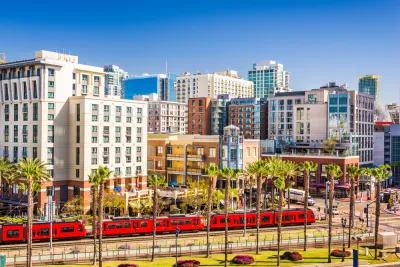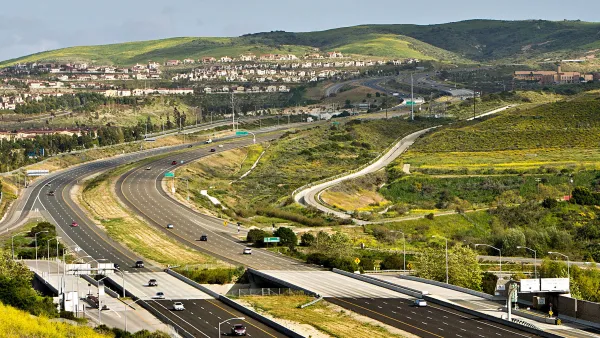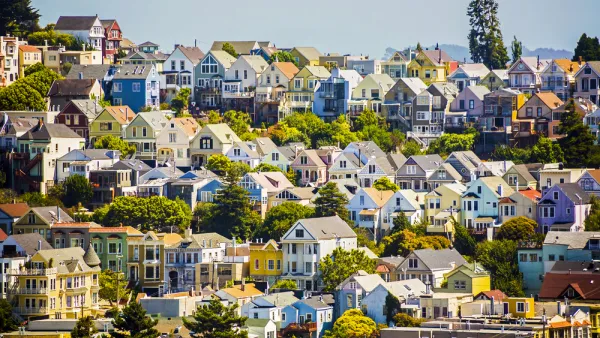Two difficult votes last year, both requiring super-majorities, are paying huge dividends to 28 transformative projects throughout the Golden State to improve rail and transit service and reduce greenhouse gas emissions.

"State officials announced Thursday that $2.4 billion from increases in the gas tax and vehicle fees will be spent on dozens of transit projects, including work to prepare Southern California for the 2028 Summer Olympics," report Patrick McGreevy and Laura J. Nelson for the Los Angeles Times on April 26. The funds were made possible by the passage of SB 1, the Road Repair and Accountability Act of 2017, last April, hiking gas taxes 12 cents per gallon and diesel taxes by 20 cents, effective Nov. 1, 2017.
An additional $1.9 billion for the projects will come from funds collected by the state's landmark climate change program, which requires polluters to buy carbon emission credits, the officials said.
The state's cap-and-trade program had fallen on hard times, but the passage of AB 398 last July, which extends the program through 2030, and a positive outcome on litigation last July, have made for a brighter future for the only state-run carbon trading program in the nation.
The money will go to six [Los Angeles County] Metropolitan Transit Authority expansion projects [jpg], including light-rail extensions to Torrance and Montclair, and additional rapid transit service along congested corridors, according to the California State Transportation Agency, which allocated the money.
That amounts to $1.792 billion, reports Steve Hymon for The Source, Metro's blog. "The California Transportation Commission is scheduled to adopt the funding awards at its meeting on May 16 and 17...Many of the projects recommended for funding are part of the [$120 Billion] Measure M Expenditure Plan — as we’ve said before, having local funding helps attract state and federal funding."
As for the rail and transit projects being transformative, those are the words of the California State Transportation Agency (CalSTA). The $2.6 billion for 28 recipients [pdf] from the new Transit and Intercity Rail Capital Program will fund "transformative capital improvements that modernize California’s intercity rail, bus, ferry and rail transit systems." They need to reduce greenhouse gas emissions as they tap the Greenhouse Gas Reduction Fund.
Looming threat over future grants
McGreevy pens a separate article, also on April 26, about the gas tax repeal initiative.
Republicans are on the verge of turning in at least 830,000 signatures for an initiative to repeal the tax increase. Even before they know for sure it will appear on the November ballot, the party's candidates up and down the state already are acting to direct voter anger over higher fuel prices at Democrats who boosted the levies.
Sen. Jim Beall (D-San Jose), the author of SB 1, was asked about that threat at a press conference on Thursday, reports Melanie Curry for Streetsblog California.
“It would be a very unwise decision to turn your back on this major transformative transit project for the Bay Area,” he said, referring to the extension of Bay Area Rapid Transit into downtown San Jose, which was awarded a [$730 million] TIRCP grant. “I have no doubt the voters of Silicon Valley will reject this foolish notion, which would seriously affect the Bay Area economy and Silicon Valley’s economy.”
Michael Cabanatuan reports for the San Francisco Chronicle on other major transportation projects in the Bay Area to receive funding from the CalSTA grants.
FULL STORY: Billions from gas tax and vehicle fees will go to transit projects, California officials announce

Analysis: Cybertruck Fatality Rate Far Exceeds That of Ford Pinto
The Tesla Cybertruck was recalled seven times last year.

National Parks Layoffs Will Cause Communities to Lose Billions
Thousands of essential park workers were laid off this week, just before the busy spring break season.

Retro-silient?: America’s First “Eco-burb,” The Woodlands Turns 50
A master-planned community north of Houston offers lessons on green infrastructure and resilient design, but falls short of its founder’s lofty affordability and walkability goals.

Test News Post 1
This is a summary

Analysis: Cybertruck Fatality Rate Far Exceeds That of Ford Pinto
The Tesla Cybertruck was recalled seven times last year.

Test News Headline 46
Test for the image on the front page.
Urban Design for Planners 1: Software Tools
This six-course series explores essential urban design concepts using open source software and equips planners with the tools they need to participate fully in the urban design process.
Planning for Universal Design
Learn the tools for implementing Universal Design in planning regulations.
EMC Planning Group, Inc.
Planetizen
Planetizen
Mpact (formerly Rail~Volution)
Great Falls Development Authority, Inc.
HUDs Office of Policy Development and Research
NYU Wagner Graduate School of Public Service




























